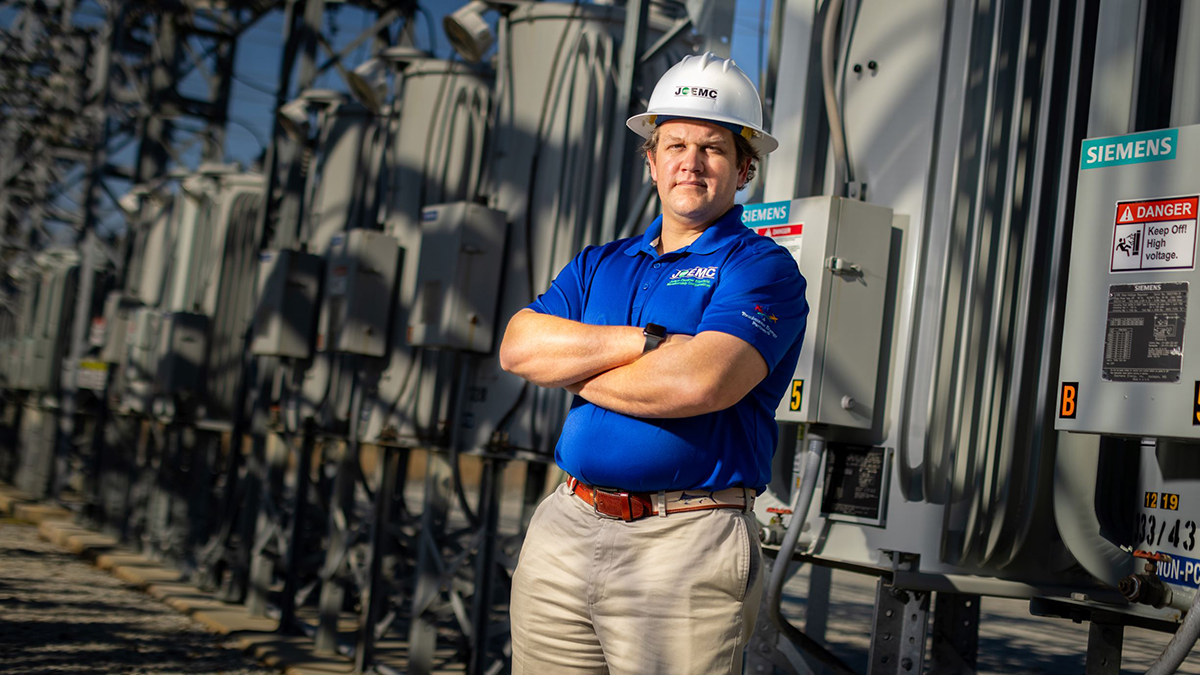career of the month
Utility Engineer Aaron Spencer
Utility engineers work in energy-producing industries, involving power sources such as electricity, hydraulic, nuclear, or green energy. Their tasks can range from researching and predicting consumers’ energy use patterns to designing or maintaining energy distribution systems. Aaron Spencer is assistant vice president of engineering at Jones-Onslow Electric Membership Corporation (JOEMC), an electric utility in Jacksonville, North Carolina.
Work overview
Engineers at electric cooperatives are often asked to do many things. I have led many large projects through the years. Typically my days start with supporting the staking technicians’ latest needs. These technicians design the system piece by piece for new developments and new customer service requests. The technicians bring us questions about transformer and service sizing, and we also help them determine costs. After that, I begin to work on the next highest priority tasks, whether working on system design for new development, distribution automation and substation improvements, or long-range system planning. The engineering team has to lay out the primary cable and transformer locations for each of the new residential subdivisions that are being built in the JOEMC service territory each year. We have to remain informed about these projects to make sure the overall system is designed correctly. I am also currently leading the team that will develop an advanced distribution management system (ADMS) for JOEMC. It will take many of our corporate software applications and integrate them into a common platform to gain greater operational efficiencies.
I enjoy working with teams of people to solve problems. I also like the fact that I get to work on many different issues, because it keeps things from getting repetitive and boring. My least favorite part of the job is working long hours during storms. As a coastal electrical utility, we get occasional storms that damage our distribution system, which can upset customers and require many hours to fix.
Career highlights
I have been heavily involved in automating and improving our distribution system. In 2015, I helped implement a conservation voltage reduction (CVR) program. Reducing the voltage to the minimum allowable limits during peak times reduces the load on the system, which is a big deal. Expanding CVR systemwide has allowed us to save millions of dollars in power costs, which has helped us delay rate increases for our customers. The same platform allows us to monitor and control the majority of substation circuit breakers remotely from the office. The first time we opened and closed a breaker remotely was a big day because it showed that we had some powerful technology at our fingertips. I was also the project lead for our advanced metering infrastructure project, which required JOEMC to change our whole electric-meter system, from the central software all the way out to the more than 75,000 electrical meters across our network.
Career path
I have always had an interest in science, how things work, and problem solving. In high school, I took electives such as computer repair and drafting. At the time, I wanted to go into dentistry, but I also wanted to attend East Carolina University. Plans for a dental school there had stalled, but a new engineering program had just been approved, so I applied and got in. I quickly realized that I really enjoyed the engineering curriculum and decided this was really what I wanted to do. I most enjoyed the electrical courses and the project management courses.
The summer after my sophomore year, I worked as an intern at the ConAgra Foods plant near my home. I worked there again the following summer and then did my senior capstone project for them. After graduation, they hired me full-time as a shift maintenance supervisor. It was a great starting job, but the job’s repetitive nature made me realize I didn’t want to make a career of it. I wanted to become a licensed professional engineer (PE), and that required working under a PE in order to be able to sit for the state exam. A PE is the highest mark for an engineer, and it opens up more employment opportunities. I found a job as an electrical engineer working for a PE at JOEMC. I then passed my exams and became a PE myself. I worked on many projects over the years and was eventually promoted to assistant vice president of engineering.
Knowledge, skills and training needed
For the technical side of the job, utility engineers need to have electrical knowledge, to ensure that different components of the distribution system are sized correctly, and to analyze different operating characteristics. We also need to have mechanical knowledge, to make sure structural elements such as poles and substation steel can withstand the loads that are applied to them. An even more important part of the job is people and project management. Managing projects across departments takes navigation skills. Sometimes people do things that may benefit their department but that also cause grief in other departments, and managers need to find solutions that work for the organization as a whole.
Advice for students
Think of your path through your career as filling a tool chest. In high school, you are learning the fundamental tools (especially in math and physics) to be successful in college. In college, you are filling your chest with tools to make you successful as a beginning engineer. College doesn’t teach you how to do the tasks that are specific to a particular company; instead, it provides you with the knowledge and skills you’ll need to guide your employer into a better future. Not one time in college did we program an SEL protective relay, for example, but we did discuss in general how protective relays work. An engineer then continues to put tools in their tool chest every day in order to have a successful career.
Bonus points
Spencer’s Education: BS in systems engineering, East Carolina University
On the Web: www.tdworld.com, www.electric.coop
Related Occupations: SCADA technician, relay technician, staking/conversion technician
Careers Engineering High School



